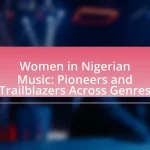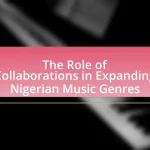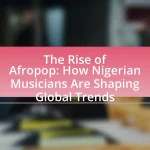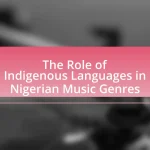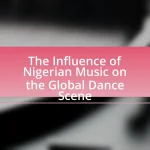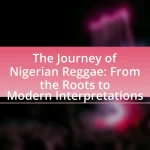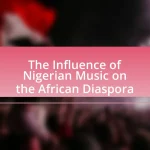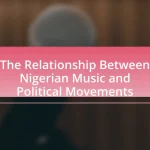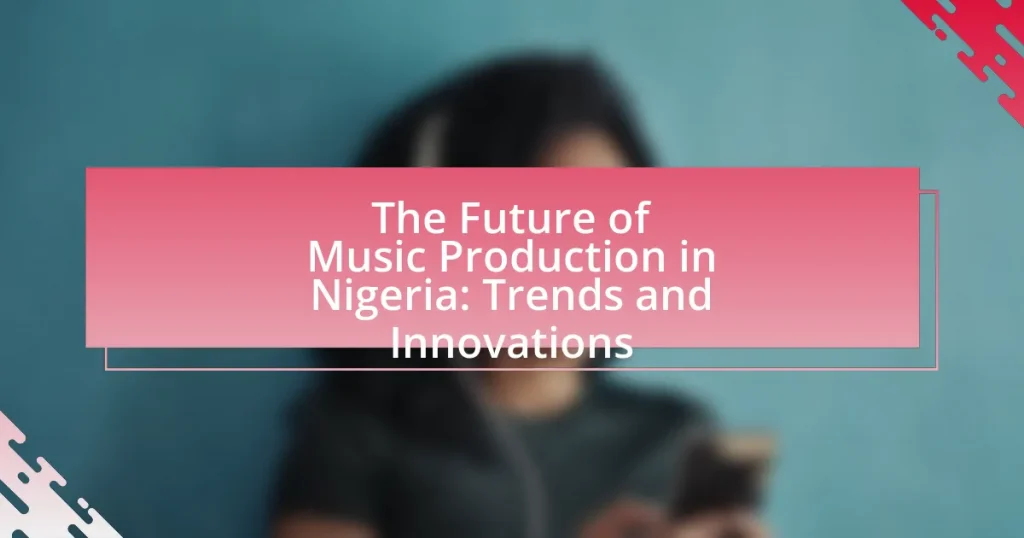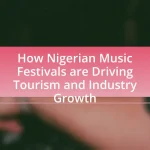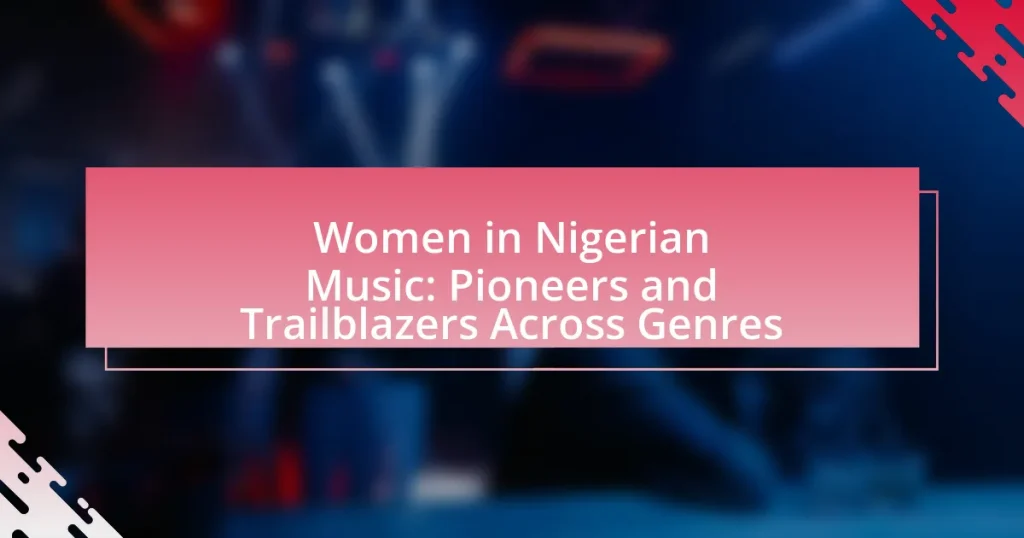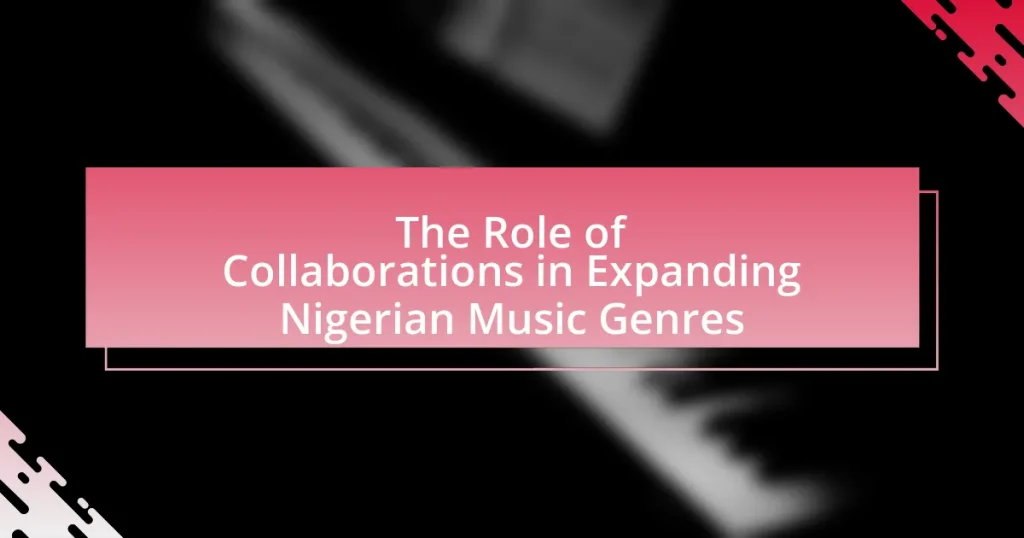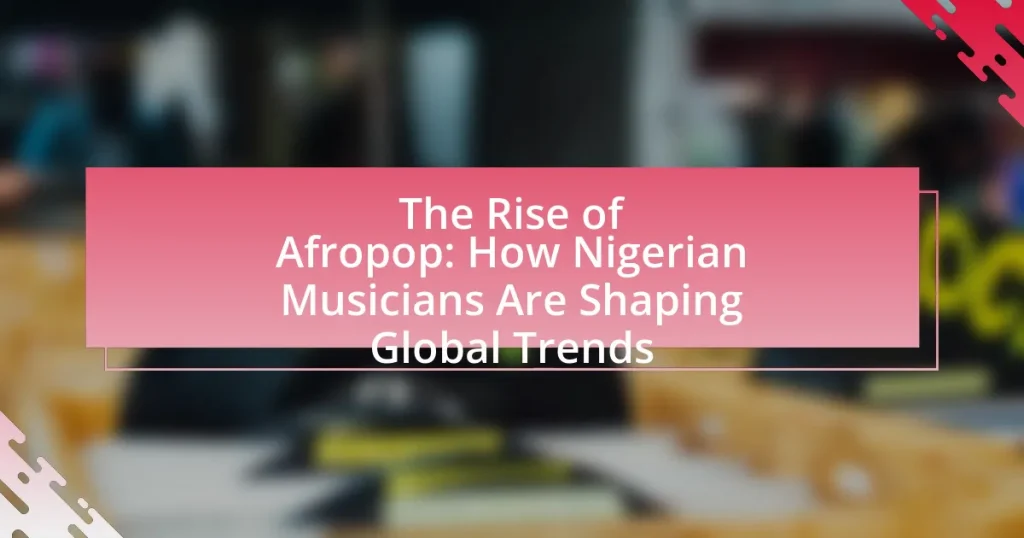The article focuses on the future of music production in Nigeria, highlighting current trends and innovations shaping the industry. Key topics include the rise of digital platforms for music distribution, the impact of technology on production processes, and the significance of collaborations among artists. It discusses emerging technologies such as digital audio workstations and mobile recording applications, as well as the evolving music consumption landscape driven by streaming services. Additionally, the article addresses challenges faced by producers, the influence of economic factors, and strategies for emerging artists to leverage new trends in music production.
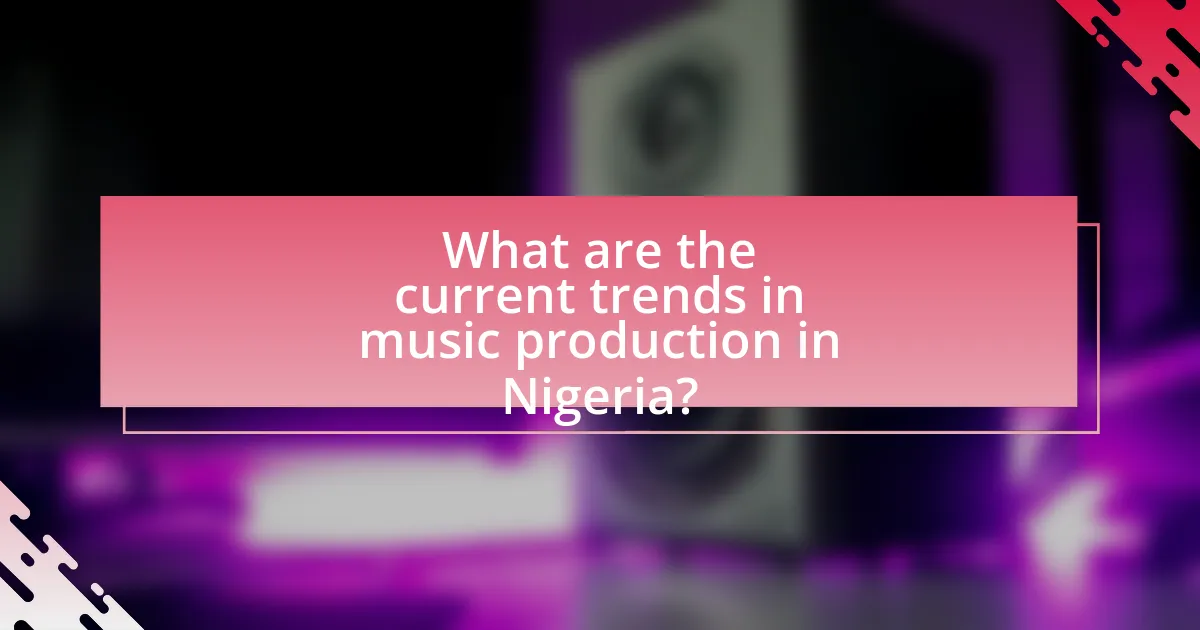
What are the current trends in music production in Nigeria?
Current trends in music production in Nigeria include the rise of digital platforms, increased collaboration among artists, and the integration of diverse musical genres. Digital platforms like Spotify and Apple Music have transformed how music is distributed and consumed, allowing artists to reach global audiences. Collaboration is becoming more prevalent, with artists from different genres and backgrounds working together, which enhances creativity and innovation in music. Additionally, the blending of Afrobeat with genres such as hip-hop, R&B, and electronic music reflects the evolving soundscape in Nigeria. These trends are supported by the growing number of independent producers and the accessibility of music production technology, which empowers more artists to create and share their work.
How is technology influencing music production in Nigeria?
Technology is significantly influencing music production in Nigeria by enhancing accessibility, improving sound quality, and fostering collaboration among artists. Digital audio workstations (DAWs) like FL Studio and Ableton Live have become widely used, allowing producers to create high-quality music from home studios. The proliferation of affordable recording equipment and software has democratized music production, enabling emerging artists to produce and distribute their work independently. Additionally, platforms like SoundCloud and YouTube facilitate global reach, allowing Nigerian music to gain international exposure. According to a 2021 report by the International Federation of the Phonographic Industry, Nigeria’s music industry revenue grew by 23% in 2020, largely driven by digital sales and streaming, underscoring the transformative impact of technology on the sector.
What specific technologies are emerging in Nigerian music production?
Emerging technologies in Nigerian music production include digital audio workstations (DAWs), mobile recording applications, and artificial intelligence (AI) tools for music composition and mixing. DAWs like FL Studio and Ableton Live are increasingly popular among Nigerian producers for their user-friendly interfaces and extensive features, enabling high-quality music production. Mobile recording applications, such as BandLab and GarageBand, allow artists to create music on-the-go, democratizing access to music production tools. Additionally, AI technologies, like Amper Music and AIVA, are being utilized for generating music and enhancing production efficiency, reflecting a global trend towards automation in creative processes. These technologies are reshaping the landscape of music production in Nigeria, making it more accessible and innovative.
How do these technologies enhance the creative process for artists?
Technologies enhance the creative process for artists by providing innovative tools that streamline production and foster collaboration. For instance, digital audio workstations (DAWs) allow musicians to compose, edit, and mix music more efficiently, significantly reducing the time from concept to final product. Additionally, cloud-based platforms enable real-time collaboration among artists, regardless of geographical barriers, facilitating diverse input and creativity. Research indicates that the use of AI in music production can generate unique sounds and compositions, further expanding artistic possibilities. These advancements not only improve workflow but also inspire new creative directions, ultimately enriching the artistic landscape.
What role do collaborations play in the evolution of music production?
Collaborations significantly enhance the evolution of music production by fostering innovation and blending diverse musical styles. In Nigeria, collaborations between artists, producers, and genres have led to the creation of unique sounds, such as the fusion of Afrobeats with hip-hop and traditional music. This cross-pollination not only broadens the audience reach but also encourages experimentation with new production techniques. For instance, the collaboration between Nigerian artist Burna Boy and American producer Timbaland resulted in a global hit that showcased the potential of merging different cultural influences. Such partnerships have been instrumental in positioning Nigerian music on the international stage, demonstrating that collaboration is a key driver of growth and creativity in music production.
How are local and international collaborations shaping the industry?
Local and international collaborations are significantly shaping the music production industry in Nigeria by enhancing creativity, expanding market reach, and fostering innovation. These partnerships allow Nigerian artists to blend local sounds with global music trends, resulting in unique genres that appeal to a broader audience. For instance, collaborations with international producers and artists have led to the successful fusion of Afrobeats with genres like hip-hop and R&B, increasing the global visibility of Nigerian music. Additionally, data from the International Federation of the Phonographic Industry indicates that Nigerian music exports have grown, with collaborations playing a crucial role in this expansion. Such partnerships not only elevate the quality of music production but also create opportunities for local talent to gain international recognition.
What are the benefits of collaboration for Nigerian producers and artists?
Collaboration offers significant benefits for Nigerian producers and artists, including enhanced creativity, access to diverse skills, and increased market reach. By working together, artists can blend different musical styles and ideas, leading to innovative sounds that resonate with broader audiences. Furthermore, collaboration allows producers to leverage each other’s expertise, resulting in higher quality productions. For instance, partnerships can facilitate entry into new markets, as artists can tap into each other’s fan bases, thereby expanding their reach. This is evident in the Nigerian music industry, where collaborations have led to international recognition and success, exemplified by artists like Burna Boy and Wizkid, who have gained global acclaim through strategic partnerships.
How is the music consumption landscape changing in Nigeria?
The music consumption landscape in Nigeria is shifting towards digital platforms, with a significant increase in streaming services like Spotify and Apple Music. This transition is driven by the growing internet penetration, which reached approximately 50% of the population in 2023, and the rise of mobile devices, making music more accessible. Additionally, local platforms such as Boomplay have gained popularity, reflecting a preference for homegrown content. According to a report by the International Federation of the Phonographic Industry (IFPI), Nigeria’s music market grew by 25% in 2022, highlighting the rapid adoption of digital consumption methods.
What platforms are gaining popularity for music distribution?
Platforms gaining popularity for music distribution include DistroKid, TuneCore, and CD Baby. These platforms have seen increased usage due to their user-friendly interfaces, affordable pricing, and extensive reach to streaming services like Spotify and Apple Music. For instance, DistroKid reported distributing over 1 million songs in 2021, highlighting its rapid growth in the industry. Additionally, the rise of independent artists in Nigeria has contributed to the popularity of these platforms, as they provide accessible means for artists to distribute their music globally without the need for traditional record labels.
How do changing consumer preferences affect music production styles?
Changing consumer preferences significantly influence music production styles by driving producers to adapt their techniques and sounds to meet audience demands. For instance, the rise of streaming platforms has led to a preference for shorter songs and catchy hooks, prompting producers to focus on creating more radio-friendly tracks. Additionally, the popularity of genres like Afrobeats in Nigeria has encouraged producers to incorporate local rhythms and instruments, reflecting the cultural shift in listener tastes. This adaptation is evident in the increased use of digital production tools and collaboration with diverse artists to create hybrid sounds that resonate with a broader audience.
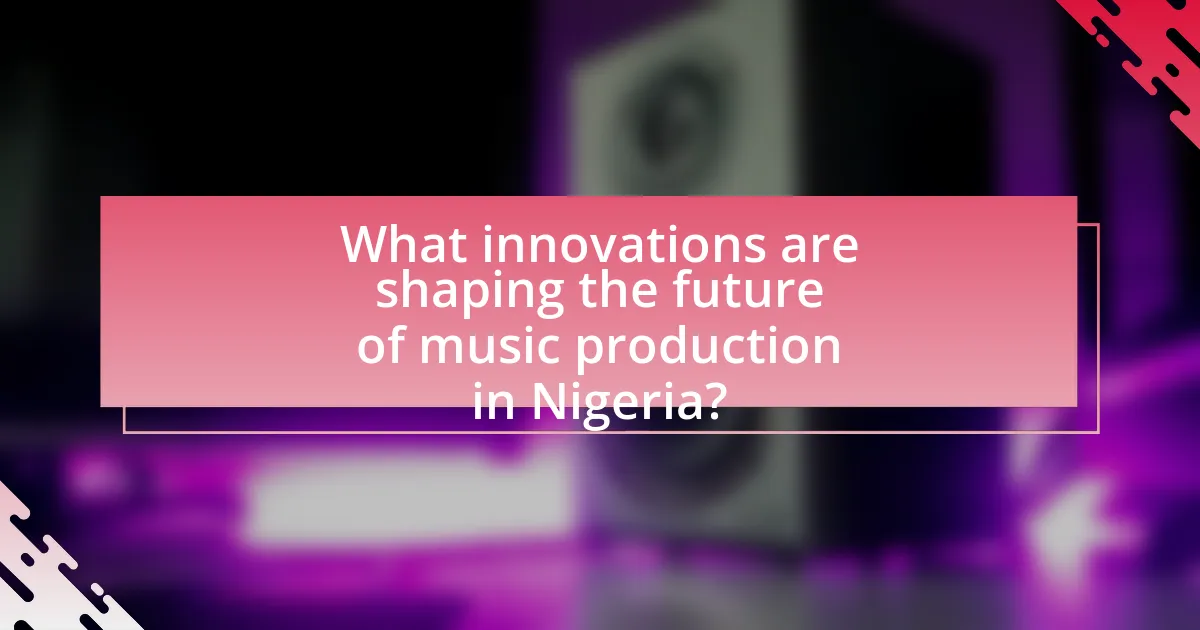
What innovations are shaping the future of music production in Nigeria?
Innovations shaping the future of music production in Nigeria include the rise of digital audio workstations (DAWs), mobile recording technology, and the integration of artificial intelligence in music creation. Digital audio workstations like FL Studio and Ableton Live have democratized music production, allowing aspiring producers to create high-quality music from home. Mobile recording technology, such as apps and portable interfaces, enables artists to capture ideas on the go, fostering creativity and collaboration. Additionally, artificial intelligence tools are being used for tasks like music composition and sound design, streamlining the production process and enhancing creativity. These innovations reflect a significant shift in how music is produced in Nigeria, making it more accessible and efficient for artists and producers alike.
How are Nigerian producers adapting to global music trends?
Nigerian producers are adapting to global music trends by incorporating diverse musical styles and advanced production techniques. They are blending Afrobeat with genres like hip-hop, R&B, and electronic music, which reflects the global fusion trend. For instance, producers such as Sarz and Pheelz have successfully integrated international sounds into their work, leading to collaborations with global artists like Drake and Beyoncé. This cross-pollination not only enhances the appeal of Nigerian music on international platforms but also allows local producers to leverage streaming services, which have seen a 50% increase in Nigerian music consumption globally from 2020 to 2023.
What genres are becoming more prominent in Nigerian music production?
Afrobeats and hip-hop are becoming more prominent in Nigerian music production. Afrobeats, characterized by its fusion of traditional African rhythms with contemporary sounds, has gained international recognition, with artists like Burna Boy and Wizkid leading the charge. Additionally, Nigerian hip-hop is evolving, with artists such as Olamide and Nasty C incorporating local dialects and themes, further enhancing its appeal. The rise of digital platforms and social media has facilitated the global reach of these genres, contributing to their growing prominence in the Nigerian music landscape.
How is the fusion of genres influencing production techniques?
The fusion of genres is significantly influencing production techniques by encouraging the integration of diverse sounds and methods, leading to innovative approaches in music creation. This blending allows producers to experiment with various instruments, rhythms, and vocal styles, resulting in unique sonic landscapes that reflect a broader cultural palette. For instance, the rise of Afrobeats has seen producers incorporate elements from hip-hop, dancehall, and electronic music, which has transformed traditional production practices in Nigeria. This trend is supported by the increasing accessibility of digital audio workstations and sampling tools, enabling artists to merge genres seamlessly and push creative boundaries.
What impact do social media and digital marketing have on music production?
Social media and digital marketing significantly enhance music production by facilitating direct artist-to-fan engagement and promoting music through targeted advertising. This direct interaction allows artists to gather real-time feedback, refine their sound, and build a loyal fan base. For instance, platforms like Instagram and TikTok enable musicians to share snippets of their work, creating viral trends that can lead to increased streams and sales. According to a 2021 report by the International Federation of the Phonographic Industry, 70% of music consumers discover new music through social media, illustrating its critical role in shaping music production and marketing strategies.
How are artists using social media to promote their music?
Artists are using social media to promote their music by leveraging platforms like Instagram, TikTok, and Twitter to engage with fans and share content. These platforms allow artists to showcase their music through short clips, live performances, and behind-the-scenes footage, creating a personal connection with their audience. For instance, TikTok has become a significant tool for music promotion, with viral challenges and trends helping songs gain popularity; a notable example is the song “Savage Love” by Jawsh 685 and Jason Derulo, which gained traction through TikTok challenges. Additionally, artists utilize social media for targeted advertising, reaching specific demographics and expanding their listener base effectively. This strategy is supported by data showing that 70% of music listeners discover new music through social media platforms, highlighting the effectiveness of these promotional methods.
What strategies are effective for engaging audiences online?
Effective strategies for engaging audiences online include utilizing interactive content, leveraging social media platforms, and personalizing communication. Interactive content, such as polls, quizzes, and live Q&A sessions, encourages audience participation and fosters a sense of community. Social media platforms, particularly those popular in Nigeria like Instagram and TikTok, allow for direct interaction and real-time feedback, enhancing engagement. Personalization, through targeted messaging and tailored content, increases relevance and connection with the audience. Research indicates that personalized emails can lead to a 29% higher open rate, demonstrating the effectiveness of tailored communication in engaging audiences.
What are the challenges faced by music producers in Nigeria?
Music producers in Nigeria face several challenges, including inadequate infrastructure, limited access to funding, and piracy. Inadequate infrastructure, such as unreliable power supply and poor internet connectivity, hampers the production process and affects the quality of music. Limited access to funding restricts producers from investing in high-quality equipment and marketing, which is crucial for competing in the global music industry. Additionally, piracy significantly undermines revenue, as unauthorized distribution of music reduces the financial returns for producers and artists alike. These challenges collectively hinder the growth and sustainability of music production in Nigeria.
How do economic factors influence music production capabilities?
Economic factors significantly influence music production capabilities by determining the availability of resources, funding, and market access for artists and producers. For instance, a strong economy can lead to increased investment in music technology and infrastructure, enabling higher-quality production and broader distribution channels. Conversely, economic downturns can restrict budgets for recording, marketing, and promotion, limiting the ability of artists to produce and share their work. In Nigeria, the growth of the music industry has been supported by economic factors such as rising disposable incomes and increased access to digital platforms, which facilitate music distribution and consumption. According to the International Federation of the Phonographic Industry (IFPI), the Nigerian music market has seen significant growth, attributed to both local and international investments, highlighting the direct correlation between economic conditions and music production capabilities.
What are the barriers to accessing advanced production tools?
Barriers to accessing advanced production tools in Nigeria include high costs, limited availability, inadequate infrastructure, and lack of technical training. High costs prevent many producers from purchasing or renting sophisticated equipment, as professional-grade tools can be prohibitively expensive. Limited availability of these tools in local markets further exacerbates the issue, making it difficult for producers to find the necessary equipment. Inadequate infrastructure, such as unreliable electricity and internet connectivity, hampers the effective use of advanced production tools. Additionally, a lack of technical training and resources limits the ability of aspiring producers to learn how to use these tools effectively, thereby restricting their access to advanced production capabilities.
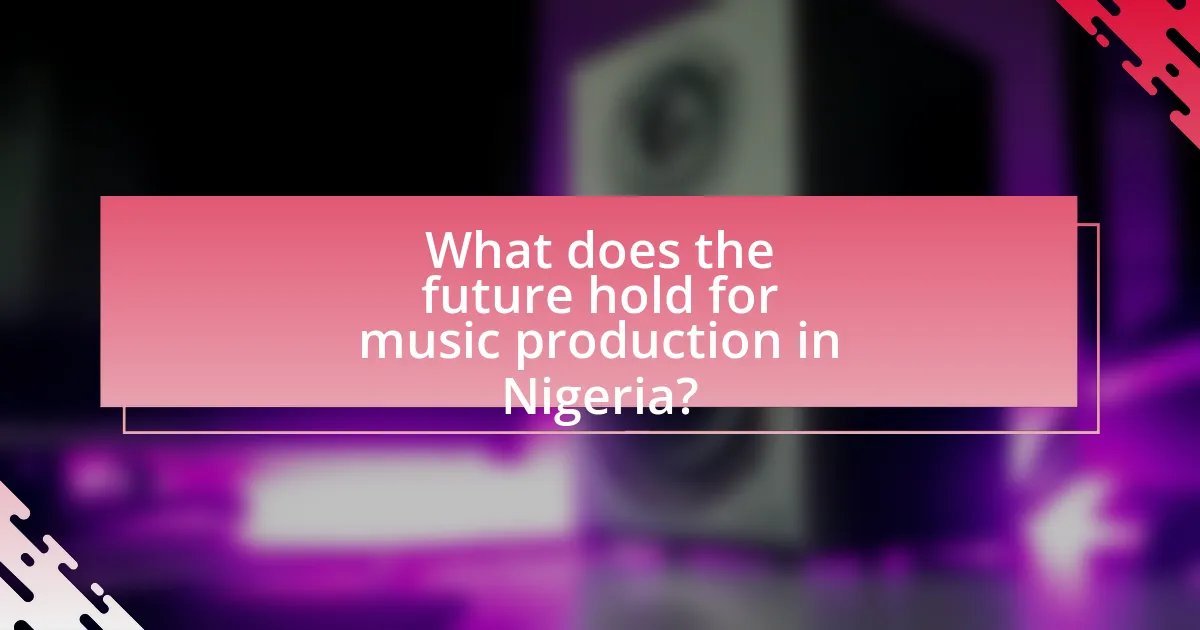
What does the future hold for music production in Nigeria?
The future of music production in Nigeria is poised for significant growth and innovation, driven by advancements in technology and a burgeoning local talent pool. The increasing accessibility of digital audio workstations and affordable recording equipment is enabling more artists and producers to create high-quality music independently. Additionally, the rise of streaming platforms has expanded the reach of Nigerian music globally, allowing local artists to gain international recognition. According to the International Federation of the Phonographic Industry, Nigeria’s music industry is projected to grow by 10% annually, reflecting the increasing demand for Afrobeat and other genres. This growth is further supported by government initiatives aimed at promoting the creative industry, which will likely enhance infrastructure and funding for music production.
How can emerging artists leverage new trends in music production?
Emerging artists can leverage new trends in music production by utilizing accessible digital tools and platforms that enhance creativity and distribution. For instance, the rise of affordable software like Ableton Live and FL Studio allows artists to produce high-quality music without significant financial investment. Additionally, the increasing popularity of online collaboration tools enables artists to work with producers and musicians globally, expanding their creative horizons. According to a report by the International Federation of the Phonographic Industry, digital music revenues in Nigeria grew by 25% in 2020, highlighting the potential for emerging artists to reach wider audiences through digital channels. By embracing these trends, artists can effectively navigate the evolving music landscape and establish their presence in the industry.
What skills should new producers focus on developing?
New producers should focus on developing technical skills, creativity, and industry knowledge. Technical skills include proficiency in digital audio workstations (DAWs), sound design, and mixing techniques, which are essential for producing high-quality music. Creativity is crucial for generating unique sounds and concepts that resonate with audiences. Industry knowledge encompasses understanding market trends, networking, and marketing strategies, which are vital for navigating the competitive landscape of music production in Nigeria. These skills collectively enhance a producer’s ability to innovate and succeed in the evolving music industry.
How can artists effectively use technology to enhance their music?
Artists can effectively use technology to enhance their music by leveraging digital audio workstations (DAWs), online collaboration tools, and social media platforms. Digital audio workstations, such as Ableton Live and FL Studio, allow artists to create, edit, and produce high-quality music from their own homes, significantly reducing production costs and time. Online collaboration tools, like Splice and Soundtrap, enable musicians to work together remotely, fostering creativity and innovation across geographical boundaries. Additionally, social media platforms, including Instagram and TikTok, provide artists with avenues to promote their music, engage with fans, and gain exposure, which is crucial in the competitive music industry. These technologies not only streamline the production process but also expand the reach and impact of artists’ work.
What best practices can be adopted for successful music production?
Successful music production can be achieved by adopting best practices such as meticulous planning, effective collaboration, and continuous learning. Meticulous planning involves setting clear goals for each project, which helps streamline the production process and ensures that all team members are aligned. Effective collaboration is crucial, as it fosters creativity and innovation; working with diverse talents can lead to unique soundscapes and ideas. Continuous learning is essential in the rapidly evolving music industry, where staying updated on new technologies and trends can significantly enhance production quality. For instance, a study by the International Federation of the Phonographic Industry (IFPI) highlights that producers who embrace new tools and techniques are more likely to succeed in creating commercially viable music.
How can collaboration and networking improve production quality?
Collaboration and networking can significantly improve production quality by facilitating the exchange of ideas, skills, and resources among artists and producers. When individuals from diverse backgrounds work together, they bring unique perspectives and expertise that can enhance the creative process, leading to more innovative and polished final products. For instance, a study by the Berklee College of Music found that collaborative projects often result in higher-quality recordings due to the pooling of technical skills and creative input. Additionally, networking allows access to better equipment and technology, as artists can share resources or collaborate with those who have advanced tools, further elevating the production quality.
What resources are available for aspiring music producers in Nigeria?
Aspiring music producers in Nigeria have access to various resources, including online courses, local music production schools, and community workshops. Notable online platforms such as Coursera and Udemy offer courses specifically tailored to music production, while institutions like the Muson School of Music in Lagos provide formal education and hands-on training. Additionally, local workshops and meetups organized by music collectives and industry professionals foster networking and skill development. These resources collectively enhance the skills and knowledge necessary for success in the Nigerian music production landscape.
What are the key takeaways for navigating the future of music production in Nigeria?
The key takeaways for navigating the future of music production in Nigeria include embracing digital technology, fostering collaboration among artists, and understanding the importance of global distribution channels. Digital technology, such as DAWs and online platforms, has revolutionized music production, allowing for greater accessibility and creativity. Collaboration among artists enhances innovation and cross-genre experimentation, which is vital in a diverse music landscape. Furthermore, leveraging global distribution channels, like streaming services, is essential for reaching wider audiences and maximizing revenue opportunities, as evidenced by the rise of Nigerian artists on platforms like Spotify and Apple Music, which have seen significant growth in user engagement in Nigeria.
